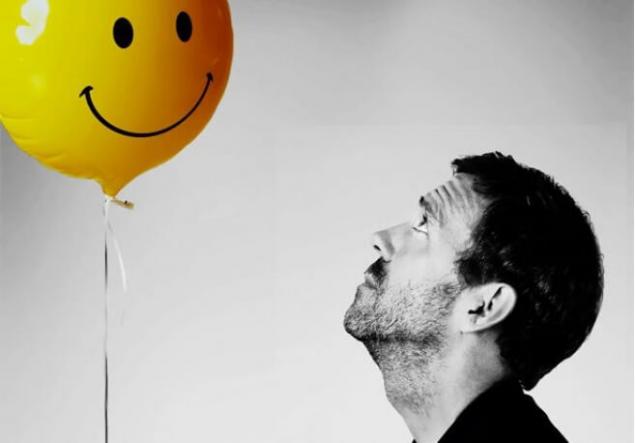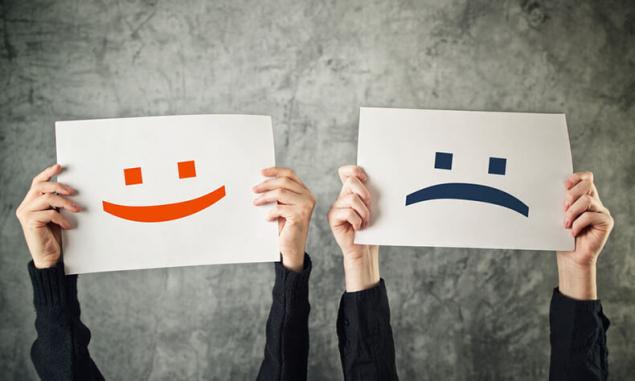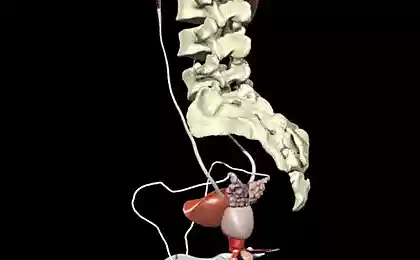543
The lack of objectivity leads to a healthier well-being
Optimism or pessimism, depressive realism, or the rose-colored glasses, objectivity or flexible thinking?
Published a translation of an article from The New Yorker magazine in which columnist Mary Konnikova says that years of psychological research have to say about the pros and cons of pessimism, depression helps us to get rid of the illusion of control to which we all tend, and why, despite all this, a positive life attitude gives us much more than an objective look at things.

As formulated by Ambrose Bierce in his "devil's Dictionary", a cynic is "a scoundrel, a mistaken view, which sees things as they are, not as they should be". A century after the death of Birs science soglasilas with him.
Cynicism in all its forms — makes us look so much more realistic, although this view may turn out to have a high price.
The phenomenon known to psychologists as "depressive realism," was first discovered Lauren Ella (Lauren Alloy) and the Abramson Lin (Lyn Abramson), psychologists from northwestern University and the state University of new York at stony brook, who has studied the illusion of control: a situation in which people felt that they are in control of something when in fact nothing of them depended.
In 1979, the year they formed two experimental groups: one group included students from colleges affected by depression, the other got students without symptoms of depression.
They had set the task — to assess how they can influence the light that will either be included, or not, when they push the button. In fact, it was not an exact match between the subjects and the emergence of light. The light was included then, when the participant pushed the button, then when it didn't.
From experiment to experiment varied only the frequency with which the action coincided with the result. Scientists have discovered that depressed people are much better able to identify those cases when they had no control over the situation, while sidepressure students tended to overestimate the degree of influence on the appearance of light.
The difference became even more interesting when Ella and Abramson added money in the experiment. In some cases, the actions of the students were associated with the loss. Participants started with five dollars and was gradually losing money as the lights do not respond to their actions (25 cents for each attempt).
In other cases the appearance of light brought financial benefits: participants started from scratch, but received twenty-five cents every time I switched on a light. In the end, everyone was out, ever lost $ 5 (first situation) or he won the money (in the second situation).
When the psychologists asked participants how much they controlled the situation throughout the experiment, those who had no depression, believed that they have a greater impact on the light than it really was, but only in situations of winning. When these participants were losing money, according to their estimates, they controlled the game less than it really was.
Depressed participants, in contrast, was far more accurate in their judgments about these situations. Thus, Ella and Abramson suggested that depression prevents unwarranted illusion of control, when someone wins, and creates a sense of responsibility when someone loses. Studies that were carried out after experiments Alloy and Abramson have also shown that depressive realism may be the result of General pessimism and, Yes, cynicism.
By 1992, Ella and Abramson were able to reproduce the original results obtained in numerous contexts and continued the logic of the research. According to scientists, it's not just that depressed people are more realistic in their judgments, but that the illusion of control, common among the participants without a depression, is likely to protect them from the appearance of this depression.
In other words,look at the world through rose-colored glasses, no matter how justified, allowed people to maintain a healthy mental state.

Depression leads to objectivity.The lack of objectivity leads to a more healthy feeling, more agile, and more flexible thinking. A meta-analysis conducted in 2004-m to year the Abramson and his colleagues at the University of Wisconsin in Madison, confirmed that the tendency to positive ("positive distortion") does not depend on age or nationality.
They came to the conclusion that was found and open the effect "can represent today one of the largest effects demonstrated in psychological studies of cognition".
Why is this so? As it turns out, how we explain the world can have a very real effect on our physical and emotional well-being — both positive and negative. This phenomenon is a psychologist from Harvard University, Daniel Gilbert (Daniel Gilbert) called the "psychological immune system", which is a feedback between how we think and how we feel. If we think more optimistically, we tend to feel better which in turn makes us think more optimistically.
The idea that Outlook on life is linked to our well-being, is not new. In the sixties at the University of Connecticut psychologist Julian rotter (Julian Rotter) suggested that we can see/perceive external events in one of two ways: either we believe that we control them, or prefer to think that they were the result of the influence of circumstances. She found that successful people tend to reproduce the same behavior. They perceive success as a result of their actions and do not take into account the negative results.
Ten years later, psychologists Feibel Bobby (Bobbi Fibel) and W. Daniel Hale (W. Daniel Hale) found that the effect has a big impact: when you think you have the ability to do something well (mind that scientists call "total installation to be successful") — you will likely be able to avoid negative life scenarios. Doesn't matter, you control the situation or not, plays a role only your belief that you can be only positive things.
Of course, optimistic people are not immune from a lightning strike and they still can move the car — and an overabundance of optimism can lead to extremely negative consequences associated with self — confidence from the wrong financial decisions before a catastrophic political blunders. But, as discovered by Fibel and Hale, positive expectations, usually lead to positive results.
More recently, psychologists Michael Sayer (Michael Scheier) and Charles Carver (Charles Carver) went even further in his research:
they suggested that the positive effect may not only be the result of control and expectations (7).
Instead, they suggested that matters is your General Outlook on life, or, as they call it, your "life orientation".
They test attitudes (Life Orientation Test, or LOT) measures how a person reacts to a number of statements that range from "Hardly expect that everything goes the way I want it" to "In uncertain times I usually expect the best".
Positive responses related to the overall success, and negative associated with depression and feelings of helplessness. In the review of the positive health effects of an optimistic view on life, psychologists have found that a more positive prognosis, even if it were erroneous, is associated with better ability to cope with stressful situations.
What is more, it prevents the development of depression: a study of the condition of women observed during the last trimester of pregnancy and during the first three weeks after they gave birth showed that the initial level of optimism predicted low likelihood of postpartum depression.
In addition, the students who performed in a number of psychological assessments with a high level of optimism during the first days of school, three months had far better academic results and were more successful.
But the observed effects may go beyond the psychological framework.
Men are more optimistic before they had surgery for coronary artery bypass surgery, were less prone to heart attacks during surgery and recovered faster after that.
In the new review, Carver and Sheier further expanded their initial findings to show that increased optimism, taking account of other factors, also leads to a more successful career, protects from loneliness at the end of life, strengthens marriage and friendships, reduces the risk of cardiovascular disease and mortality in women, protects from stroke, reduces the need for re-hospitalization after surgery, and improves sleep quality in children.
In all cases, optimism serves as a screen that allows us to see life in the light of ensuring our mental and physical well being.
Says Daniel Gilbert, it all comes back to expectations.
When we expect that we will cope with something, we move on.
When we look down, we cease to resist.
Depressive realists and cynics set themselves a lower bar, when you start something and then give up when they discover that they are hopelessly behind.
As said Fluff is familiar pessimist Ia in the work of A. A. Milne, "we can't all and some of us don't want. That's all". Eeyore finds his tail or a house — so many things. In fact, his expectations are so low that it seems not worth the effort.
The negative opinion itself defines: you set lower expectations, do less, achieved less and got a negative experience, which in turn conforms to your initial negative attitude.
Of course, unjustified optimism, too, may cost cost. This mindless optimism Tigers, who finds himself stuck in a tree and eating a Thistle. The optimism of the Tigers, constantly getting into trouble. When we are overly cocky and think that control of the situation, we can find that have spent themselves trying to solve a hopeless task.
We unconsciously refuse happiness
10 myths about forgiveness
Optimism and pessimism will require a balance. If you set the bar too high, the consequences can be just as dangerous. If you aspire to an Olympic medal in figure skating when you can barely do a double Axel, it is hardly possible to avoid disappointment.
However, it seems much more useful to think like a Tiger than like Eeyore. At least this tells us the study.published
Author: Maria Konnikova
Source: monocler.ru/tsinizm-ili-optimizm/
Published a translation of an article from The New Yorker magazine in which columnist Mary Konnikova says that years of psychological research have to say about the pros and cons of pessimism, depression helps us to get rid of the illusion of control to which we all tend, and why, despite all this, a positive life attitude gives us much more than an objective look at things.

As formulated by Ambrose Bierce in his "devil's Dictionary", a cynic is "a scoundrel, a mistaken view, which sees things as they are, not as they should be". A century after the death of Birs science soglasilas with him.
Cynicism in all its forms — makes us look so much more realistic, although this view may turn out to have a high price.
The phenomenon known to psychologists as "depressive realism," was first discovered Lauren Ella (Lauren Alloy) and the Abramson Lin (Lyn Abramson), psychologists from northwestern University and the state University of new York at stony brook, who has studied the illusion of control: a situation in which people felt that they are in control of something when in fact nothing of them depended.
In 1979, the year they formed two experimental groups: one group included students from colleges affected by depression, the other got students without symptoms of depression.
They had set the task — to assess how they can influence the light that will either be included, or not, when they push the button. In fact, it was not an exact match between the subjects and the emergence of light. The light was included then, when the participant pushed the button, then when it didn't.
From experiment to experiment varied only the frequency with which the action coincided with the result. Scientists have discovered that depressed people are much better able to identify those cases when they had no control over the situation, while sidepressure students tended to overestimate the degree of influence on the appearance of light.
The difference became even more interesting when Ella and Abramson added money in the experiment. In some cases, the actions of the students were associated with the loss. Participants started with five dollars and was gradually losing money as the lights do not respond to their actions (25 cents for each attempt).
In other cases the appearance of light brought financial benefits: participants started from scratch, but received twenty-five cents every time I switched on a light. In the end, everyone was out, ever lost $ 5 (first situation) or he won the money (in the second situation).
When the psychologists asked participants how much they controlled the situation throughout the experiment, those who had no depression, believed that they have a greater impact on the light than it really was, but only in situations of winning. When these participants were losing money, according to their estimates, they controlled the game less than it really was.
Depressed participants, in contrast, was far more accurate in their judgments about these situations. Thus, Ella and Abramson suggested that depression prevents unwarranted illusion of control, when someone wins, and creates a sense of responsibility when someone loses. Studies that were carried out after experiments Alloy and Abramson have also shown that depressive realism may be the result of General pessimism and, Yes, cynicism.
By 1992, Ella and Abramson were able to reproduce the original results obtained in numerous contexts and continued the logic of the research. According to scientists, it's not just that depressed people are more realistic in their judgments, but that the illusion of control, common among the participants without a depression, is likely to protect them from the appearance of this depression.
In other words,look at the world through rose-colored glasses, no matter how justified, allowed people to maintain a healthy mental state.

Depression leads to objectivity.The lack of objectivity leads to a more healthy feeling, more agile, and more flexible thinking. A meta-analysis conducted in 2004-m to year the Abramson and his colleagues at the University of Wisconsin in Madison, confirmed that the tendency to positive ("positive distortion") does not depend on age or nationality.
They came to the conclusion that was found and open the effect "can represent today one of the largest effects demonstrated in psychological studies of cognition".
Why is this so? As it turns out, how we explain the world can have a very real effect on our physical and emotional well-being — both positive and negative. This phenomenon is a psychologist from Harvard University, Daniel Gilbert (Daniel Gilbert) called the "psychological immune system", which is a feedback between how we think and how we feel. If we think more optimistically, we tend to feel better which in turn makes us think more optimistically.
The idea that Outlook on life is linked to our well-being, is not new. In the sixties at the University of Connecticut psychologist Julian rotter (Julian Rotter) suggested that we can see/perceive external events in one of two ways: either we believe that we control them, or prefer to think that they were the result of the influence of circumstances. She found that successful people tend to reproduce the same behavior. They perceive success as a result of their actions and do not take into account the negative results.
Ten years later, psychologists Feibel Bobby (Bobbi Fibel) and W. Daniel Hale (W. Daniel Hale) found that the effect has a big impact: when you think you have the ability to do something well (mind that scientists call "total installation to be successful") — you will likely be able to avoid negative life scenarios. Doesn't matter, you control the situation or not, plays a role only your belief that you can be only positive things.
Of course, optimistic people are not immune from a lightning strike and they still can move the car — and an overabundance of optimism can lead to extremely negative consequences associated with self — confidence from the wrong financial decisions before a catastrophic political blunders. But, as discovered by Fibel and Hale, positive expectations, usually lead to positive results.
More recently, psychologists Michael Sayer (Michael Scheier) and Charles Carver (Charles Carver) went even further in his research:
they suggested that the positive effect may not only be the result of control and expectations (7).
Instead, they suggested that matters is your General Outlook on life, or, as they call it, your "life orientation".
They test attitudes (Life Orientation Test, or LOT) measures how a person reacts to a number of statements that range from "Hardly expect that everything goes the way I want it" to "In uncertain times I usually expect the best".
Positive responses related to the overall success, and negative associated with depression and feelings of helplessness. In the review of the positive health effects of an optimistic view on life, psychologists have found that a more positive prognosis, even if it were erroneous, is associated with better ability to cope with stressful situations.
What is more, it prevents the development of depression: a study of the condition of women observed during the last trimester of pregnancy and during the first three weeks after they gave birth showed that the initial level of optimism predicted low likelihood of postpartum depression.
In addition, the students who performed in a number of psychological assessments with a high level of optimism during the first days of school, three months had far better academic results and were more successful.
But the observed effects may go beyond the psychological framework.
Men are more optimistic before they had surgery for coronary artery bypass surgery, were less prone to heart attacks during surgery and recovered faster after that.
In the new review, Carver and Sheier further expanded their initial findings to show that increased optimism, taking account of other factors, also leads to a more successful career, protects from loneliness at the end of life, strengthens marriage and friendships, reduces the risk of cardiovascular disease and mortality in women, protects from stroke, reduces the need for re-hospitalization after surgery, and improves sleep quality in children.
In all cases, optimism serves as a screen that allows us to see life in the light of ensuring our mental and physical well being.
Says Daniel Gilbert, it all comes back to expectations.
When we expect that we will cope with something, we move on.
When we look down, we cease to resist.
Depressive realists and cynics set themselves a lower bar, when you start something and then give up when they discover that they are hopelessly behind.
As said Fluff is familiar pessimist Ia in the work of A. A. Milne, "we can't all and some of us don't want. That's all". Eeyore finds his tail or a house — so many things. In fact, his expectations are so low that it seems not worth the effort.
The negative opinion itself defines: you set lower expectations, do less, achieved less and got a negative experience, which in turn conforms to your initial negative attitude.
Of course, unjustified optimism, too, may cost cost. This mindless optimism Tigers, who finds himself stuck in a tree and eating a Thistle. The optimism of the Tigers, constantly getting into trouble. When we are overly cocky and think that control of the situation, we can find that have spent themselves trying to solve a hopeless task.
We unconsciously refuse happiness
10 myths about forgiveness
Optimism and pessimism will require a balance. If you set the bar too high, the consequences can be just as dangerous. If you aspire to an Olympic medal in figure skating when you can barely do a double Axel, it is hardly possible to avoid disappointment.
However, it seems much more useful to think like a Tiger than like Eeyore. At least this tells us the study.published
Author: Maria Konnikova
Source: monocler.ru/tsinizm-ili-optimizm/
Why can't I get pregnant — obvious reasons
Know how to fall in love, and can't hold: What did I do wrong























